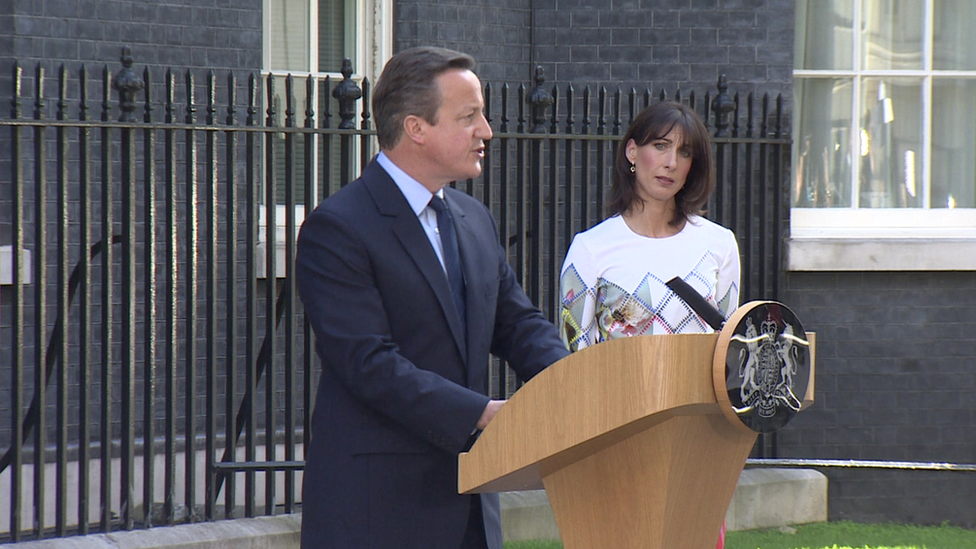How surprised should we be by the Welsh Brexit vote?
- Published
- comments

Samantha Cameron watches as David Cameron delivers his resignation statement in Downing Street.
It was shortly before 02:00 BST (I listen so you don't have to) when Stephen Crabb told radio listeners that he would not be surprised if Wales voted for Brexit.
"Because I think the politics of Wales have changed quite profoundly in recent years and I think the picture you're going to see in the south Wales valleys will be similar to the results we've seen in the north east of England and some of these old industrial working-class areas which have shifted very markedly towards 'out'.
"And this will be one of the, I think, the stories of this referendum campaign - the way the spotlight has been shown on some of these quite marked social divisions and it poses a challenge not only to use as a Conservative government but to all the Westminster parties who increasingly look and sound the same."
It poses a challenge to parties in Wales too. Wales has 40 MPs; only five backed Brexit. Every single Welsh Labour MP backed remain. Many Labour supporters who voted for the party only last month in the Welsh Assembly elections clearly voted against the party line (if they knew what it was) on Thursday.
Some MPs are less surprised than others. One said he had been shouted at for the first time by a constituent during the referendum campaign. Others reported back on a virulent anti-politics mood and "our broken politics". One Labour source questioned the timing of Wednesday's announcement that the Assembly is to be asked to re-brand itself a Welsh parliament.
Not so long ago Plaid Cymru leader Leanne Wood advocated a Welsh veto on an English-led Brexit, warning:, external "An English vote for exit should not - by dint of sheer numbers - be able to trump a desire in Wales to stay in."
'Resignation'
That challenge doesn't arise but Ms Wood warned at the time of a constitutional crisis if the UK's different nations voted in different ways, and with Scotland voting to remain, she may be proved right.
Welsh parties complained that the proximity of the vote with the assembly elections had made it difficult to campaign together effectively, although the timing didn't stop the Scots voting to remain.
In his resignation statement, the prime minister said Britain must prepare for negotiation with the EU. "This will need to involve the full engagement of the Scottish, Welsh and Northern Ireland Governments, to ensure that the interests of all parts of our United Kingdom are protected and advanced," he said.
'Engagement'
With the need to comply with EU law enshrined in the statutes underpinning the devolution settlements, some tricky negotiations may lie ahead, according to the Constitution Unit. , external
Assembly Presiding Officer Elin Jones said in a statement: "We as political leaders, and the media need to reflect on the state of democratic engagement and political discourse amongst people in Wales.
"Widening respectful, meaningful democratic engagement is one of my top priorities as presiding officer."
It could be argued that the voters were engaged - turnout was far higher than in previous Welsh or UK-wide referendums, the UK general election and last month's Assembly elections.
But the result was the wrong one for many of those political leaders, who may be tempted to recall the words of Dick Tuck., external